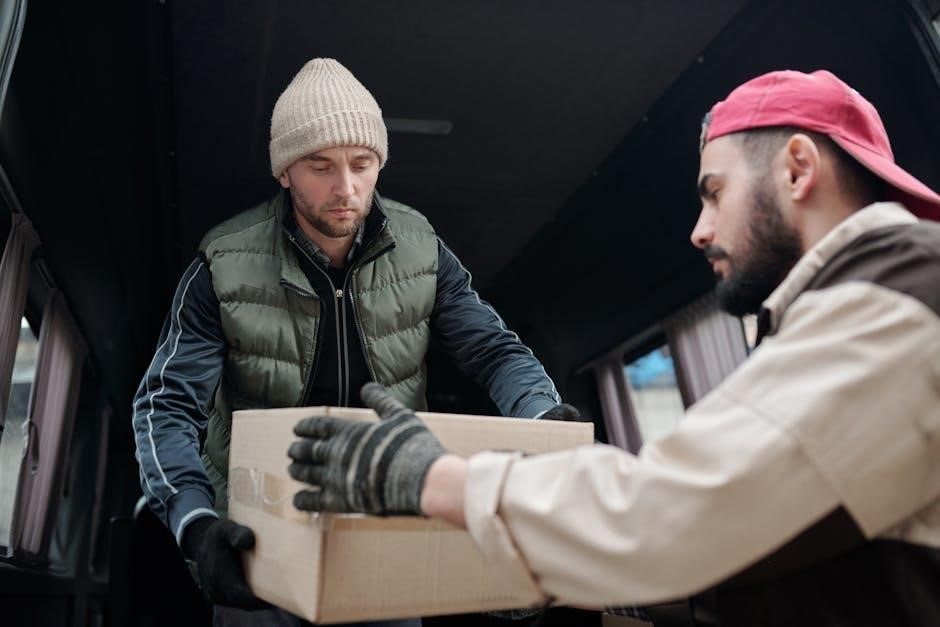
A Commercial Driver License (CDL) in Washington State is essential for operating commercial vehicles safely and legally. This guide provides detailed information on CDL requirements‚ testing‚ and regulations.
Overview of CDL Requirements
Obtaining a Commercial Driver License (CDL) in Washington State requires meeting specific federal and state regulations. The process involves passing both knowledge and skills tests‚ which ensure drivers can operate commercial vehicles safely. CDLs are categorized into classes based on vehicle type and weight‚ with additional endorsements for specialized cargo. Eligibility criteria include being at least 21 years old‚ passing a medical exam‚ and having a valid driver’s license. Applicants must also complete a vision test and provide required documentation. The CDL program aims to ensure public safety by setting high standards for commercial vehicle operators.
Eligibility Criteria for Obtaining a CDL
To be eligible for a CDL in Washington State‚ applicants must meet specific criteria. They must be at least 21 years old for interstate commerce and 18 for intrastate operations. Legal residency in Washington and a valid driver’s license are required. Applicants must pass a medical exam and vision test. They must also provide necessary documents‚ such as proof of residency and identity. Additionally‚ applicants must not have any disqualifying offenses on their driving record. Completing the application form and submitting all required documents ensures eligibility. Meeting these criteria ensures that drivers are qualified to operate commercial vehicles safely and legally.

The Process of Obtaining a CDL in Washington State
Obtaining a CDL in Washington State involves several structured steps. First‚ applicants must meet eligibility criteria‚ including age and residency requirements. Next‚ they study the CDL manual to prepare for the knowledge tests. After that‚ they apply for a Commercial Learner Permit (CLP)‚ which allows them to practice driving under supervision. Once prepared‚ they take the knowledge tests‚ followed by the skills tests to demonstrate their ability to operate a commercial vehicle safely. Finally‚ they submit all required documents‚ pay the necessary fees‚ and upon passing all tests‚ they receive their CDL.
Steps to Apply for a Commercial Learner Permit (CLP)
To apply for a Commercial Learner Permit (CLP) in Washington State‚ start by ensuring you meet the eligibility criteria. Gather required documents‚ such as proof of identity‚ residency‚ and Social Security number. Study the Washington State Commercial Driver Guide to prepare for the knowledge tests. Visit a Department of Licensing (DOL) office and submit your application. Pass the vision test and the required knowledge tests for the type of CDL you seek. Once you pass‚ you will be issued a CLP‚ which allows you to practice driving a commercial vehicle under the supervision of a licensed CDL holder. The CLP is valid for 180 days and cannot be renewed.
Required Documents and Fees
To apply for a Commercial Driver License (CDL) in Washington State‚ you must provide specific documents and pay the required fees. Required documents include proof of identity‚ residency‚ and Social Security number. You may need to submit a valid U.S. passport‚ birth certificate‚ or other government-issued ID. Residency proof can include utility bills or rental agreements. The base application fee for a CDL is currently $110‚ but additional costs may apply for endorsements or restrictions. Fees for Commercial Learner Permits (CLP) and skills tests vary. Always check with the Washington State Department of Licensing for the most accurate and updated fee schedule.
CDL Knowledge and Skills Tests
Passing the CDL knowledge and skills tests is a critical step in obtaining a Commercial Driver License in Washington State. The knowledge test covers federal and state regulations‚ safe driving practices‚ and specific requirements for your license class. The skills test assesses your ability to operate a commercial vehicle safely and includes three parts: a pre-trip inspection‚ basic vehicle control exercises‚ and an on-road driving test. Study the Washington State CDL Manual thoroughly to prepare for these exams. Practice with sample tests and behind-the-wheel training to ensure readiness. Successful completion of both tests is required to earn your CDL.

Types of Commercial Driver Licenses (CDLs)
In Washington State‚ CDLs are classified into Class A‚ B‚ and C‚ each requiring specific qualifications and authorizing operation of different commercial vehicle types.
Class A‚ B‚ and C Licenses
Class A CDLs permit operation of combination vehicles with a GVWR of 26‚011 lbs or more‚ including trailers. Class B licenses cover heavy straight trucks‚ while Class C is for small passenger vehicles or hazardous materials. Each requires specific knowledge and skills tests‚ ensuring drivers are qualified for their vehicle type. Additional endorsements may be needed for specialized cargo or passenger transport‚ enhancing employment opportunities in the trucking and transportation industry. Proper classification ensures safe and legal operation of commercial vehicles.
Endorsements and Restrictions
Endorsements on a CDL in Washington State indicate specialized qualifications‚ such as hauling hazardous materials or operating tank vehicles. Common endorsements include H (hazardous materials)‚ N (tank vehicles)‚ and P (passenger transport). Restrictions‚ such as E (automatic transmission only) or L (air brakes prohibited)‚ limit driving privileges based on test performance or vehicle type. Endorsements require additional testing and background checks‚ while restrictions ensure drivers operate only vehicles they are qualified to handle. These designations are critical for safe and legal commercial vehicle operation‚ aligning with federal and state regulations.

Vehicle Inspection and Safety
Vehicle inspection and safety are critical for commercial drivers. Regular pre-trip and post-trip checks ensure compliance with safety standards and regulations in Washington State.
Pre-Trip Inspection Checklist
A pre-trip inspection is essential to ensure vehicle safety. Drivers must check tires for damage and proper inflation‚ brakes for functionality‚ and lights for visibility. Mirrors and windows should be clean and unobstructed.Fluid levels‚ including oil‚ coolant‚ and brake fluid‚ must be verified. The steering‚ suspension‚ and exhaust systems should also be inspected. Documentation of the inspection is required to comply with regulations. This process helps prevent accidents and ensures compliance with Washington State’s commercial driving standards‚ promoting road safety for all vehicles. Regular inspections are a critical part of a driver’s responsibility.

Safe Driving Practices
Safe driving practices are crucial for commercial vehicle operators in Washington State. Maintaining a safe distance‚ using mirrors effectively‚ and being aware of surroundings are essential. Drivers must avoid distractions‚ such as using electronic devices‚ and ensure all passengers and cargo are secure. Adhering to speed limits and adjusting for weather conditions is vital. Large vehicles require extra caution‚ especially when making wide turns or stopping. Professional drivers should anticipate potential hazards and remain vigilant to prevent accidents. Following these practices ensures compliance with state regulations and promotes roadway safety for all users. Regular training and updates on safe driving techniques are recommended.

Washington State Traffic Laws for Commercial Vehicles
Understanding Washington State traffic laws is crucial for commercial drivers. These laws include specific speed limits‚ weight restrictions‚ and rules for prohibited routes and special permits.
Speed Limits and Weight Restrictions
Commercial vehicles in Washington State must adhere to specific speed limits and weight restrictions. Speed limits for commercial vehicles are typically lower than those for passenger cars‚ especially on highways and in urban areas. Weight restrictions are enforced to protect infrastructure and ensure public safety. Commercial drivers must comply with gross vehicle weight ratings and axle load limits. Exceeding these limits can result in fines and potential suspension of driving privileges. It is crucial for drivers to familiarize themselves with these regulations to avoid penalties and maintain safe road conditions. Proper planning and adherence to these rules are essential for professional drivers.
Prohibited Routes and Special Permits
In Washington State‚ certain routes are restricted for commercial vehicles due to weight‚ size‚ or safety concerns. Drivers must consult official maps or seek guidance from the Washington State Department of Transportation to identify prohibited routes. Special permits are required for oversized or overweight loads‚ which must be obtained in advance. Failure to comply with these regulations can result in fines or delays. It is essential for commercial drivers to plan their routes carefully and ensure they have the necessary permits for any unusual cargo. Adhering to these rules ensures safe and efficient travel.

Maintaining a Clean Driving Record

A clean driving record is crucial for commercial drivers in Washington State. It ensures license retention‚ job security‚ and lower insurance rates by avoiding violations and accidents.
Importance of a Good Driving Record
A good driving record is vital for commercial drivers in Washington State‚ as it directly impacts job opportunities‚ insurance rates‚ and legal standing. Employers prioritize hiring drivers with clean records‚ as it reflects responsibility and professionalism. A clean record also lowers insurance costs and avoids potential license suspensions. Additionally‚ it ensures compliance with federal and state regulations‚ maintaining public safety. Accidents or violations can lead to severe consequences‚ including loss of certification and employment. Therefore‚ adhering to traffic laws and safe driving practices is essential to uphold a pristine driving history and career longevity in the commercial driving industry.
Consequences of Traffic Violations
Traffic violations for commercial drivers in Washington State can lead to severe consequences‚ including fines‚ license suspension‚ and increased insurance rates. Repeat offenses may result in the revocation of the CDL‚ impacting employment opportunities. Employers often conduct thorough background checks‚ and a history of violations can hinder job prospects. Additionally‚ violations may require mandatory court appearances and the completion of defensive driving courses. In extreme cases‚ a criminal record can result from serious offenses‚ further complicating a driver’s career. Maintaining a clean record is crucial to avoid these repercussions and ensure continued certification as a commercial driver.

Additional Resources and Continuous Education
Washington State offers resources like the official DMV website and industry-recognized training programs. These provide updated information and courses for continuous education‚ ensuring professional development and compliance with regulations.
Washington State DMV Resources
The Washington State DMV provides essential resources for commercial drivers‚ including detailed guides‚ application forms‚ and practice tests. The official CDL Manual offers comprehensive information on state-specific laws‚ vehicle safety‚ and licensing requirements. Additionally‚ the DMV website features online portals for scheduling appointments‚ renewing licenses‚ and accessing forms. Drivers can also utilize the CDL Practice Test to prepare for knowledge exams. These resources ensure that applicants and licensed drivers stay informed and comply with all regulations. Regular updates on the DMV website help drivers navigate changes in laws and procedures efficiently.
Industry-Recognized Training Programs
Industry-recognized training programs play a crucial role in preparing drivers for commercial licensing in Washington State. These programs align with state and federal regulations‚ ensuring drivers meet rigorous safety and skill standards. Many programs include both classroom instruction and hands-on training‚ covering essential topics like vehicle inspection‚ traffic laws‚ and safe driving practices. The Washington State DMV often endorses these programs‚ which are designed to help drivers excel in CDL knowledge and skills tests. By participating in these programs‚ drivers gain the confidence and expertise needed to operate commercial vehicles safely and efficiently on the road.